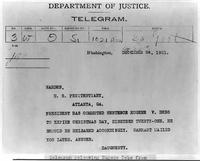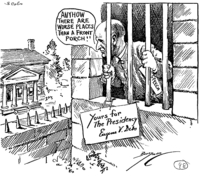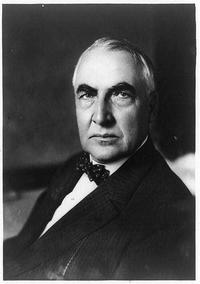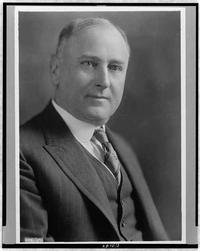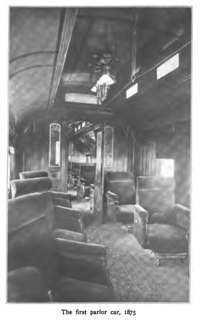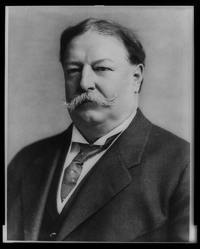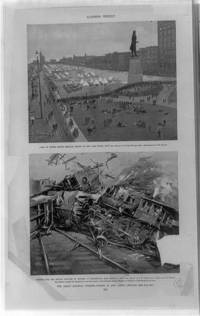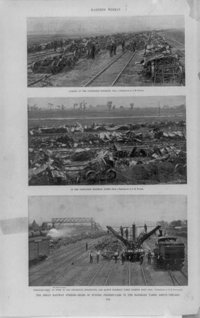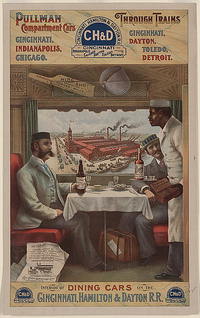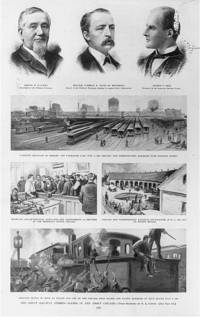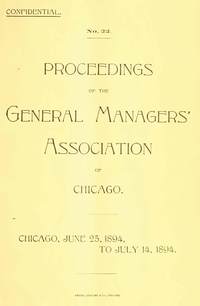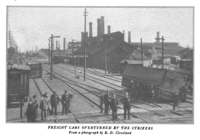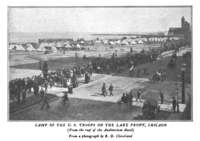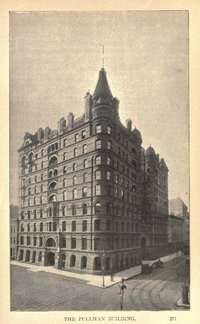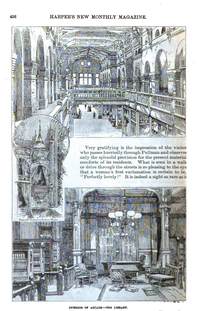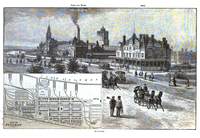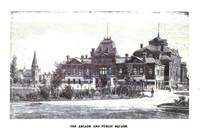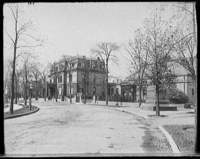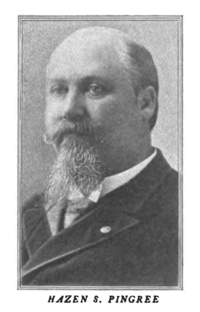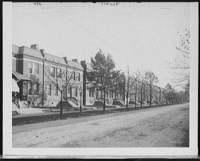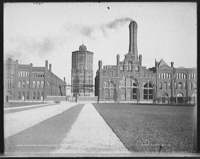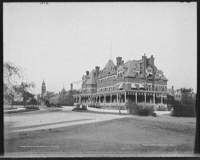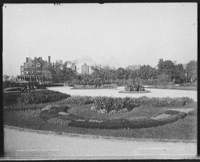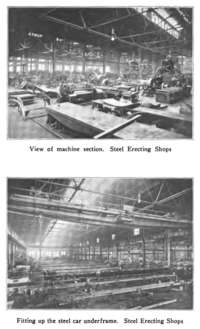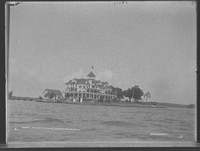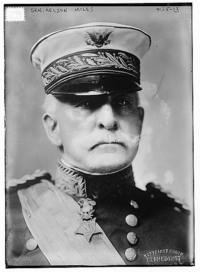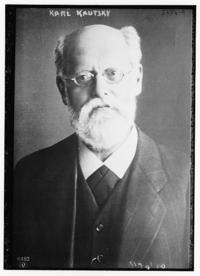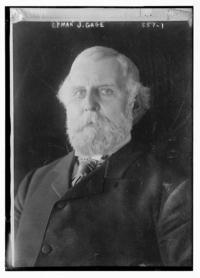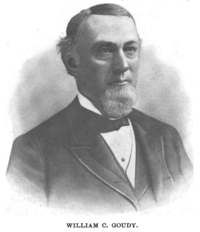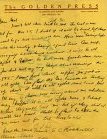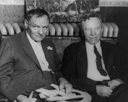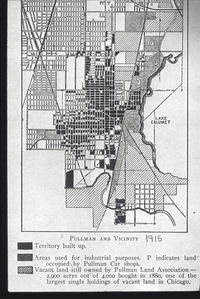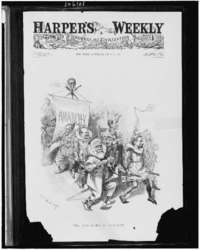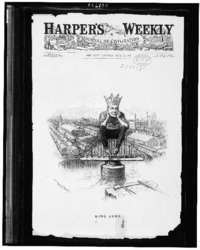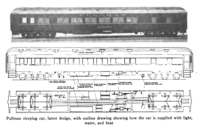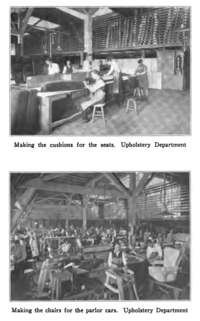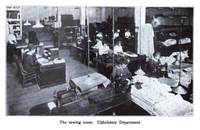The Pullman Strike
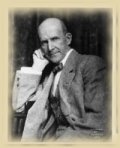
"More perhaps than any other industrial clash since the Civil War, the Pullman strike, or ''Debs Rebellion'' as it was named by the newspapers, shook the nation to its very depths, bringing to the surface all the pent-up bitterness of exploited labor, and exposing the role played by the federal government as the agent of the capitalists in their drive to crush completely the aims and activities of the labor movement." – Philip Sheldon Foner, History of the Labor Movement in the United States 261 (1975).
"When the employees of the Pullman Company walked away from their jobs on May 11, 1894, they began a process which was to result in one of the most significant encounters between labor and capital in American history." – Daniel Novak, "The Pullman Strike Cases: Debs, Darrow, and the Labor Injunction" in AMERICAN POLITICAL TRIALS 121 (Michal R. Belknap ed., 2d ed. 1994).
An English case that has been identified as the first involving the use of a labor injunction. Despite first being used in England, labor injunctions became much more widely used in the United States where they eventually became a common legal tool used against labor strikes. The first court in the United States to rely on the Springhead case was the Supreme Judicial Court of Massachusetts in Sherry v. Perkins, 147 Mass. 212, 17 N. E. 307 (1888).
Sherry v. Perkins, 147 Mass. 212, 17 N. E. 307 (1888).The first American case in which a court issued a labor injunction.
United States v. Debs, 64 F. 724 (C.C. Ill. 1894).Judge William A. Woods of the U.S. Circuit Court of Appeals for the Seventh Circuit found Debs and others guilty of contempt. They were sentenced to imprisonment in the county jail for terms varying from three to six months. This case reproduces the very expansive writ of injunction that was filed against Debs and the American Railway Union.
Brief and Argument for Petitioners Ex Parte Debs et. al. (1895).Brief and arguments for a writ of habeas corpus in the Debs case signed by Clarence Darrow.
In re Debs, 158 U.S. 564, 15 S.Ct. 900 (1895).The United States Supreme Court denied Debs' petition for a writ of habeas corpus and also held that in proceedings for contempt of court a defendant is not entitled to a jury trial. Clarence Darrow, S. S. Gregory, and Lyman Trumbull argued for Debs and the other petitioners.
Vegelahn v. Guntner, 167 Mass. 92, 44 N.E. 1077 (1896).An important case involving the use of injunctions in a labor dispute that occurred a few months after the Pullman strike. Judge Oliver Wendell Holmes wrote a well-known dissent in the case: "I have seen the suggestion made that the conflict between employers and employed was not competition. But I venture to assume that none of my brethren would rely on that suggestion. If the policy on which our law is founded is too narrowly expressed in the term "free competition," we may substitute "free struggle for life."
The Pullman Correspondence.John Peter Altgeld's commentary on the Pullman Strike. Altgeld was the governor of Illinois during the strike. Published in his 1899 book Live Questions.
The Pullman Company v. Randall Woodfolk, 121 Ill. App. 321 (1905).Personal injury case involving the fellow-servant rule. It is not clear if Clarence Darrow himself worked on this case but the appellee, a sleeping car porter employed by the appellant Pullman Company, was represented by the firm of Darrow, Masters & Wilson. The court explains the relationship between Pullman cars and the railroads: "it is a matter of common knowledge, that appellant's chief business is the furnishing of sleeping accommodations for reward to passengers who have already paid the railway company for their transportation; that it never moves a car, and has no means of so doing; that its cars are attached to and detached from railway trains by the servants of the railway company on whose lines the cars are being hauled; that the moving power is furnished solely by such railway company; and that the duties of the servants of appellant in charge of the car are confined exclusively to the interior of the car, they having nothing to do with lights, brakes, signals or any other thing relating to transportation, or to the safety of the trains."
Bloom v. Illinois, 391 U.S. 194 (1968).This 1968 case overruled In re Debs on the constitutionality of imposing punishment for contempt. The Court ruled: "[I]n our judgment, when serious punishment for contempt is contemplated, rejecting a demand for jury trial cannot be squared with the Constitution or justified by considerations of efficiency or the desirability of vindicating the authority of the court." (p. 208).
"Also published statements of the company during the continuance of the strike."
Proclamations from President Cleveland.President Cleveland sent federal military troops to Chicago on July 3, 1894 under authority of Sections 5298 and 5299 of the Revised Statutes of the United States. But the use of federal troops under section 5298 must be preceded by a proclamation that is required under Section 5300 which provides: "Whenever in the judgment of the President it becomes necessary to use the military forces under this title the President shall forthwith, by proclamation, command the insurgents to disperse and retire peaceably to their respective abodes within a limited time." However, federal troops had been dispatched to Chicago six days before Attorney General Olney realized that a presidential proclamation as required by section 5300 had not been made. So belatedly, President Cleveland issued a proclamation on July 8. He issued another proclamation on July 9 to warn rioters in other parts of the country.
Governor Altgeld's Protest Against the Use of United States Troops in Illinois (1894).Governor Altgeld sent this message to President Cleveland, strongly protesting Cleveland's decision to send federal troops to Chicago. Cleveland sent the troops even though they were not requested by any officials in Illinois and without informing Altgeld.
Report on the Chicago Strike of June-July, 1894: With Appendices Containing Testimony, Proceedings, and Recommendations.Report made by Strike Commission at the direction of President Cleveland.
The Use of the Army in Aid of the Civil Power by Guido Norman Lieber, Judge Advocate General, U.S. Army (1898).Includes discussion of the use of federal troops during the Pullman strike.
A Compilation of Documents Relating to Injunctions in Conspiracy Cases (1902).Clarence Darrow discusses the Pullman strike as an example of the dangers of the government's use of conspiracy laws. Darrow's statement begins on page 14, which is page 17 of the pdf.
Federal Aid in Domestic Disturbances 1787 - 1903.Senate study of the use of the military during domestic unrest. Includes a section on the Pullman strike and the Coeur D'Alene troubles of 1899 in Idaho.
Hearings Before the Committee on Labor on Pending Anti-Injunction Bills (1912).The injunction used in the Pullman strike is referred to several times.
Article critical of the Pullman labor strike and discussing ways to prevent strikes.
The Injunction As A Remedy For The Boycott by Herbert S. Bullard.An 1894 Yale Law Journal review article in favor of writs of injunction under equity to counteract boycotts.
Legal Restraint of Labor Strikes (1895).Article critical of the Pullman strike and in favor of labor injunctions.
Injunctions Against Strikes, Boycotts and Similar Unlawful Acts (1907).Law review article examining the evolution and current status of labor injunctions.
President Cleveland's views about the strike delivered in a 1904 lecture that was published in 1913.
The Federal Government and the Chicago Strike by Eugene V. Debs.Debs' response to an article entitled, "The Government in the Chicago Strike of 1894," written by Former President Grover Cleveland that was published in McClure's magazine in July 1904.
"The American Republic and the Debs Insurrection" by Z. Swift Holbrook (1895).This essay discusses the social and political causes of the Debs insurrection, and is highly critical of Debs.
A study of the Town of Pullman less than four years after it was founded. Published in 70 Harper's Magazine pp. 452-466.
An Appeal for Aid - Debs Legal Defense Fund (1894).Published in the American Federationist by Samuel Gompers, American Federation of Labor, AFL-CIO.
The Debs Case and Trial by Jury by Clarence Darrow (1896).Published in The Cause.
Letter to the Editor from Clarence Darrow (1897).Reprint of a letter from Darrow to the editor of The Cause discussing the Pullman strike court injunction. Darrow is dissatisfied with prior commentary about the case.
Marvin Hughitt -- Builder (1922).Article about Marvin Hughitt, president of the Chicago & North Western Railway published in Illustrated World. Hughitt was the president when Clarence Darrow worked as general counsel for Chicago & North Western Railway. Most accounts state that Darrow resigned his position as the general counsel for the Chicago & Northwestern Railway after meeting with Marvin Hughitt. Darrow told Hughitt that he had to resign so he could help defend Eugene Debs and other union leaders.
Pullman exhibit, World's Columbian Exposition, Chicago 1893.
The Law of Strikes, Lockouts and Labor Organizations by Thomas S. Cogley (1894).Chapter IX of this treatise discusses the state of the law in 1894 regarding the use of injunctions and other civil remedies.
Debs: His Life, Writings, and Speeches (1908).Several references are made to Clarence Darrow and his actions while representing Debs.
The Life of Lyman Trumbull by Horace White (1913).A former senator, Lyman Trumbull and S.S. Gregory worked with Clarence Darrow as associate counsel during the appeal of the Debs decision to the United States Supreme Court. Trumbull argued the appeal before the Court.
Labor and Freedom: The Voice and Pen of Eugene V. Debs (1916).Compilation of writings and speeches by Eugene Debs.
The Story of the Pullman Car by Joseph Husband (1917).Illustrated story of early rail transportation and the Pullman Car company.
Debs: His Authorized Life and Letters from Woodstock Prison to Atlanta (1919).Book written while Debs was in federal prison serving a ten-year sentence for violating the Espionage Act. The Pullman strike and Darrow's work in defense of Debs is recounted.
Debs and the Poets (1920).Collection of poems and letters written in honor of Eugene Debs while he was in the Atlanta Federal Penitentiary. Debs was sent there after being convicted of violating the Espionage Act because of his opposition to World War I. Introduction by Upton Sinclair.
About Clarence Darrow (1922).Excerpt from Talks with Debs in Terre Haute: (and Letters from Lindlahr) by David Karsner. Debs referred to Darrow as "an unhappy philosopher who had crowded many events into his life; who had, in fact, seen it all, and had no more illusions to be broken."
Walls and Bars by Eugene Victor Debs (1927).Debs writes about his experiences in prison.
Carroll D. Wright, United States Commissioner of Labor and a member of the United States Strike Commission which investigated the causes of the Pullman strike, penned this article. The Commission issued a comprehensive report on the results of the investigation.
Proceedings of the General Managers' Association (1894).The General Managers' Association (GMA) represented the Pullman company and twenty-four railroads with terminals entering or terminating in Chicago. The railroads represented by the GMA employed more than one-fourth of all the railroad workers in the United States. The GMA played a key role in battling the American Railway Union during the strike.
Peace By Standing Army.Speech by Henry George given at a labour meeting in Cooper Union, New York, July 12, 1894. The meeting was called to protest against President Cleveland's sending Federal troops to Chicago during the Pullman railroad strike.
The Pullman Strike by William H. Carwardine (1894).Carwardine was pastor of the First M.E. Church in the town of Pullman, Illinois for two years prior to the strike.
The Insurrection of June and July 1894 Growing out of the Pullman Strike at Chicago.An Address Delivered before the National Statistical Association of Columbian University, Washington D.C. by Joseph Nimmo, Jr. LL.D.
Special Address - The Chicago Strike of 1894 by Edgar A. Bancroft.Published in the Proceedings of the Illinois State Bar Association at its Eighteenth Annual Meeting held in Springfield, January 24 and 25, 1895.
Eighteenth Annual American Bar Association meeting.Summary of the 18th annual American Bar Association meeting in 1895. The highlighted area on the last page has a short passage about Judge William Howard Taft who took issue with Governor Altgeld's criticism of the federal courts and an observation about the Debs injunction. Taft was on the United States Circuit Court for the Sixth Circuit at this time. During his career, Taft served as the Solicitor General of the United States, Chief Justice of the U.S. Supreme Court and President of the United States.
Liberty by Eugene Debs.Speech delivered by Debs at Battery D, Chicago, on his release from Woodstock jail, November 22, 1895.
Thomas E. Milchrist.Short bio of Thomas E. Milchrist the U.S. District Attorney for the Northern District of Illinois during the Pullman strike. Milchrist helped prosecute Eugene Debs.
Proceedings of 8th annual National Convention of Railroad Commissioners (May 1896).Contains a report on protecting public interests during railway strikes and discusses proposed federal bills. Also references the Pullman strike.
Lyman Trumbull.Short bio of Lyman Trumbull who worked on the Debs defense with Clarence Darrow. From the Bench and Bar of Illinois.
Judge William A. Woods.Short bio of Judge William A. Woods who along with Judge Peter Grosscup issued the injunction against Eugene V. Debs and the American Railway Union (ARU). In September 1894 Judge Woods presided over the civil contempt proceedings in which Debs and other ARU leaders were charged with violating the injunction. In December Judge Woods found the defendants had violated the injunction in United States v. Debs, 64 F. 724 (C.C.Ill. 1894). He later sentenced them to jail. From the The Bench and Bar of Illinois: Historical and Reminiscent (1899).
Judge Peter S. Grosscup.Short bio of Judge Peter Grosscup who along with Judge William A. Woods issued the injunction against Eugene V. Debs and the American Railway Union.
Photos - Key Figures
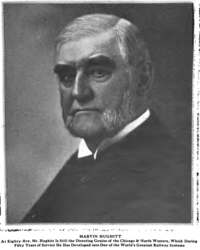
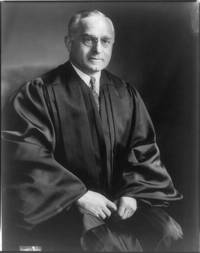

"Eugene V. Debs has always been one of my heroes. . . . There may have lived some time, some where, a kindlier, gentler, more generous man than Eugene V. Debs, but I have never known him. Nor have I ever read or heard of another. . . . He was not only all that I have said, but he was the bravest man I ever knew. He never felt fear. He had the courage of the babe who has no conception of the work or its meaning." Library of Congress Prints and Photographs Division, LC-USZ62-106026. Debs Letter to Darrow
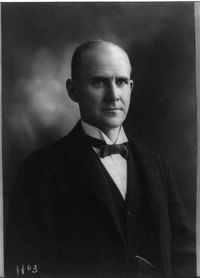
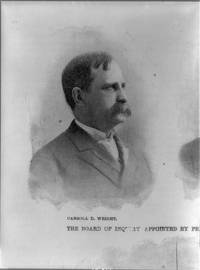
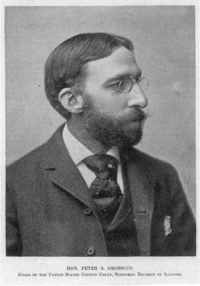
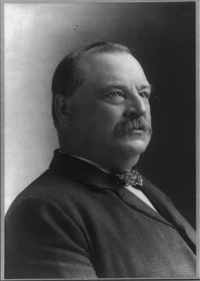
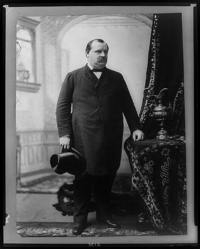
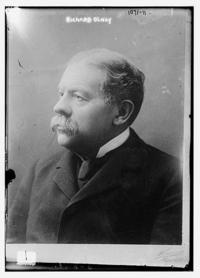
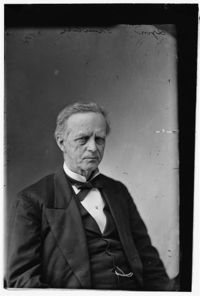
During the impeachment trial of President Andrew Johnson, Trumbull broke party ranks, and was one of only seven Republican senators that voted for acquittal in a courageous act of political suicide. The seven Republican senators were concerned that the proceedings had been manipulated so that only one side of the evidence was presented.
Trumbull was chairman of the Judiciary Committee from 1861-1872. He co-authored the Thirteenth Amendment, which prohibited all kinds of slavery in the United States. It was passed by Congress on January 31, 1865, and ratified on December 6, 1865. LC-DIG-cwpbh-03888, Library of Congress Prints and Photographs Division.
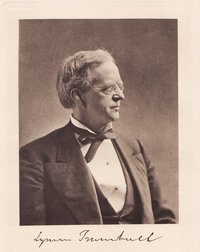
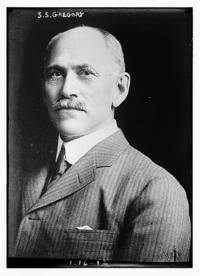
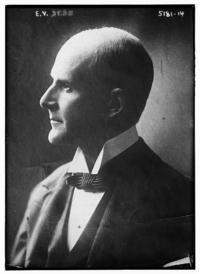
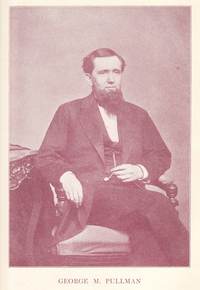
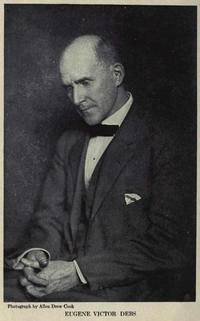
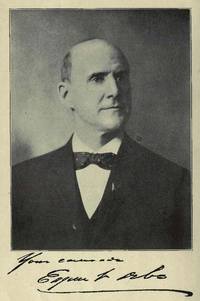
"As soon as the employees found that we were arrested and taken from the scene of action, they became demoralized, and that ended the strike. It was not the soldiers that ended the strike; it was not the old brotherhoods that ended the strike; it was simply the United States courts that ended the strike. Our men were in a position that never would have been shaken under any circumstances if we had been permitted to remain upon the field, remain among them; but once that we were taken from the scene of action and restrained from sending telegrams or issuing the orders necessary, or answering questions ... The headquarters were demoralized and abandoned, and we could not answer any telegrams or questions that would come in ... The men went back to work, and the ranks were broken, and the strike was broken up by the Federal courts of the United States, and not by the Army, and not by any other power, but simply and solely by the action of the United States courts in restraining us from discharging our duties as officers and representatives of the employees."
Debs Letter to Darrow
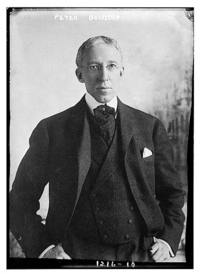
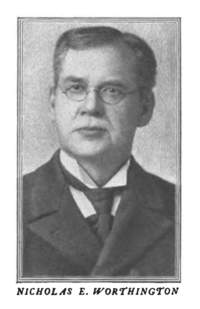
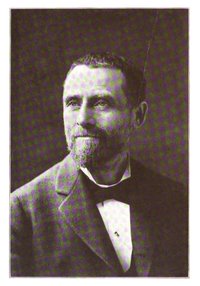
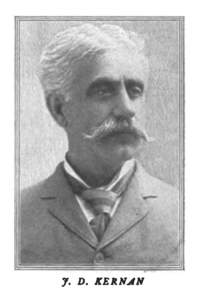
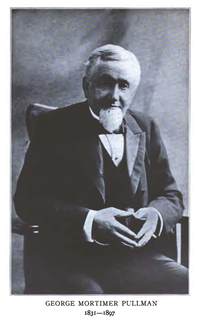
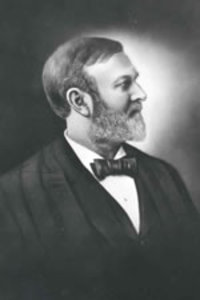
Photos
